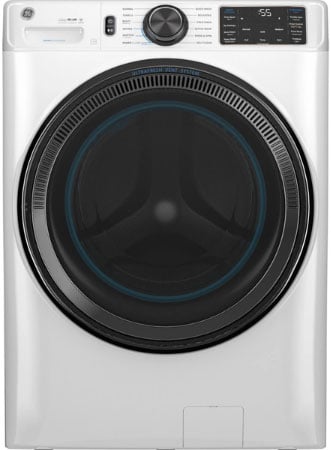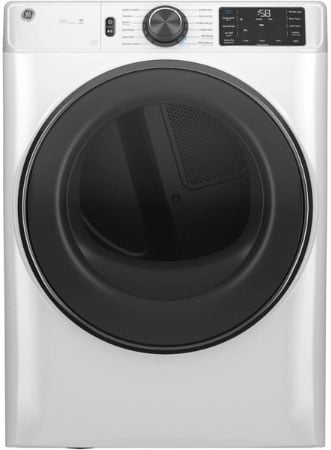GE Profile UltraFast Combo Washer & Dryer: 2024 Review
December 20th, 2023 | 22 min. read
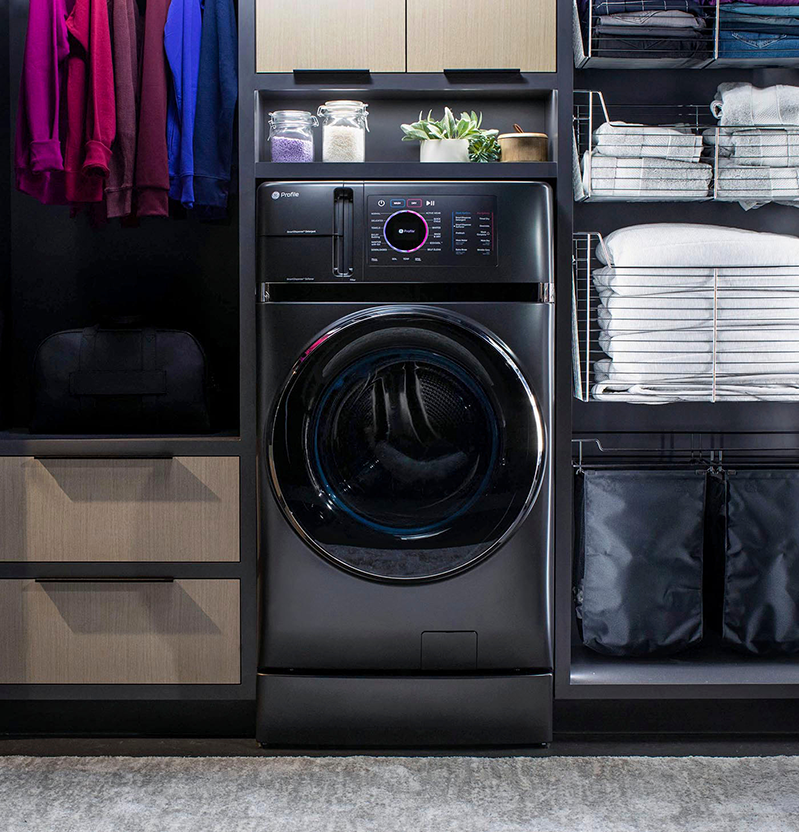
The GE Profile PFQ97HSPVDS is the most interesting and polarizing appliance introduced since I started at Yale in 1986.
You can now wash and dry your laundry in one machine without transferring the load.
Imagine the convenience of throwing a load of laundry into the wash before bed and waking up to clean dry clothes.
Ditto before you go to the office.
Does that mean you should buy one?
Maybe. Maybe not.
The answer is complicated.
It's so complicated that I included the most commonly asked questions and an interview with the lead designer for GE, Ken Rudolph, in this article.
This article is the longest since I started writing in 2007 and covers the machine and general information on the UltraFast.
Ultimately, you will understand whether the PFQ97HSPVDS is right for you.
Let's get started on a very long journey.
Don't worry; I will add some videos to help you.
Table of Contents
Table of Contents
Review of the GE Profile UltraFast Combo Washer & Dryer
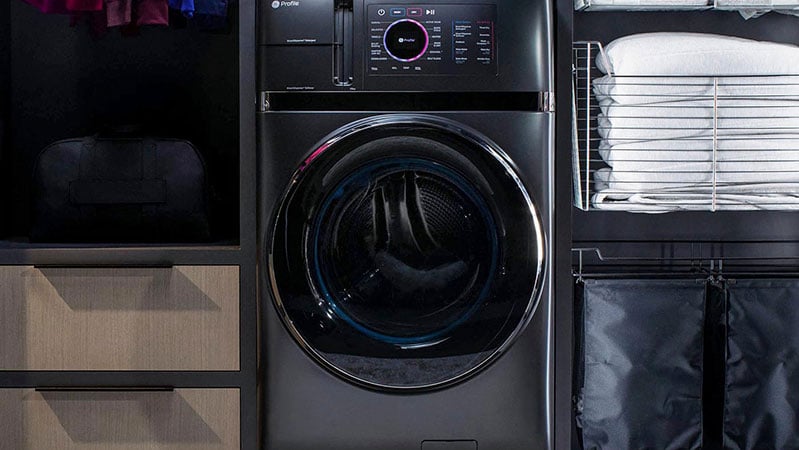
The GE Profile UltraFast Combo is an all-in-one washer and dryer, which means you don't have to transfer your clothes from the washer to the dryer.
Simply put your dirty clothes inside the machine, and they will come out clean and dry.
You will never have to worry about rewashing a load that you forgot to transfer to the dryer.
Key Features of the GE Profile UltraFast Combo
Microban Coated Surfaces

The GE Profile is similar to GE's high-end front load washers with Microban coatings to resist mold in the gasket, hoses, and dispenser.
It doesn't have GE's UltraFresh Vent System with OdorBlock because the drying cycle keeps the gasket and the inside dry.
We noticed the GE Profile's gasket was dry after we completed multiple loads of laundry during our tests.
Automatic Detergent Dispenser
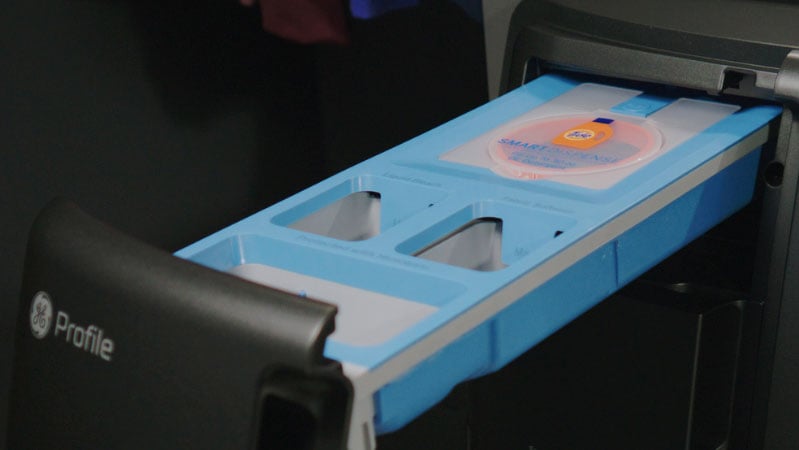
People often overload the detergent dispenser, possibly due to their habit of using excessive detergent in their old top load washers.
Front-load washers require less detergent. However, excess detergent will stay in the machine and cause service problems.
It's like that lint problem I mentioned earlier. You don't want to excess anything inside the machine.
An auto dispenser solves that problem by dispensing the exact amount of detergent needed at the right time.
GE has a 32-load capacity. You don't have to reload the detergent after every wash cycle.
Smart Functionality
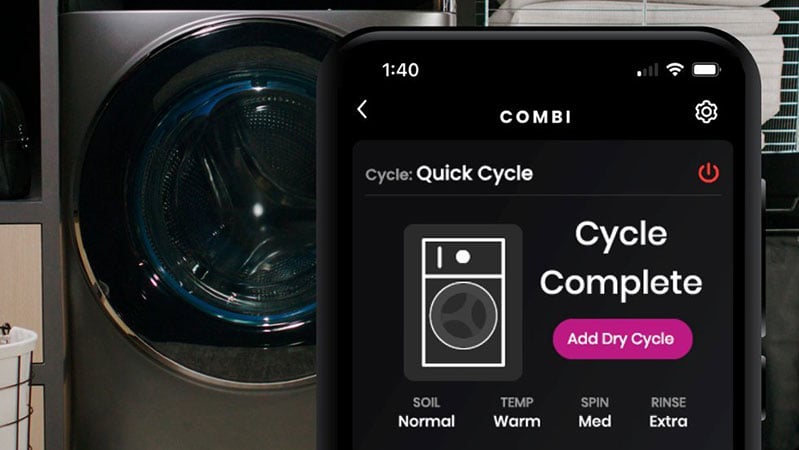
Smart functionality works for laundry. You can keep track of the remaining time and receive push notifications when the cycle is complete.
No more waiting in front of the washer with just 3 minutes and 22 seconds left on the cycle.
Furthermore, you can conveniently check the remaining amount of detergent in the dispenser directly from the app.
4.8 Cubic Foot Capacity
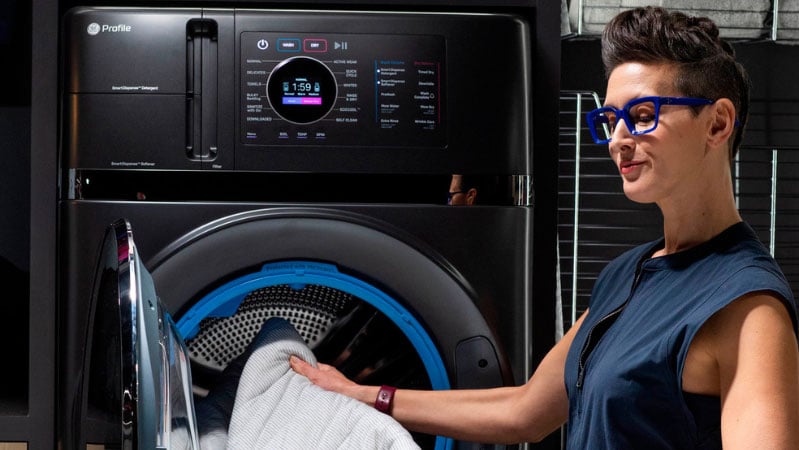
The average front load is between 4.5 and 5 cubic feet. So, this is a full-size combination of water and dryer with a lot of new technology.
The UltraFast is about twice the size of the compact laundry with a heat pump from Miele and Bosch.
Ventless Drying System
The ventless unit requires only 110 volts to power, meaning you can place this anywhere with an outlet and water.
Plus, you never have to worry about cleaning your dryer vent again.
Most people don't, so fires happen with heat and lint.
I am not trying to scare you because they don't happen often.
Unlike regular ventless condenser dryers, heat pumps don't project heat back into your room, although the top of the GE Profile did get warm in our tests.
Understanding Heat Pump Technology in the UltraFast Combo
How Much Does a Dryer Cost to Operate?
After reading this section, you will view your dryer as an energy hog.
It's important to consider the cost implications of using a dryer.
According to my electric bill, the cost of electricity in Boston is about 28.4 cents per KWH between generation and distribution.
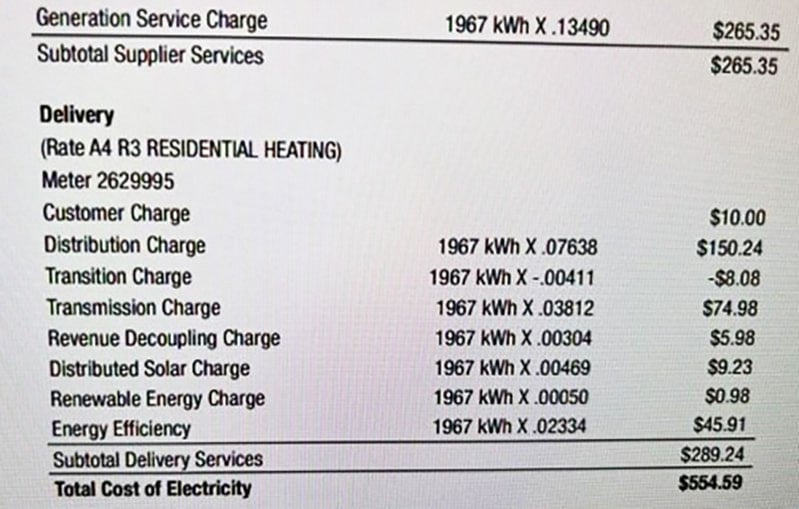
According to Whirlpool, the average dryer consumes about 3.4 per KWH, with older dryers using about 5 KWH.
Your dryer uses about 96 cents per load or about $350 per year when used just once a day.
For a family of five doing multiple loads on an older dryer, the costs could be $700 or higher for that seemingly innocent-looking appliance.
Heat Pumps vs. Vented Laundry
Vented Dryers: How They Work
Vented dryers pull heat from your room, heat it with elements, and then vent that air outside.
This inefficient process of continuously pulling and heating colder air continues throughout the cycle.
Heat Pump Dryers: How They Work
Heat pump dryers work more efficiently by reusing the air inside them. They heat this air gradually, which uses about 50-60% less energy than regular dryers.
Although they can save you money – about $175 a year on average – they do take longer to dry your clothes.
Also, they have more parts that might need fixing over time
Read More: The Pros & Cons of Heat Pump Dryers
The Problems with Combination Washers and Dryers
Reduced Drying Efficiency or Performance
These heat pumps offer greater energy efficiency but may require longer drying times.
This becomes a notable concern when dealing with a much larger unit like the GE Profile UltraFast Combo washer and dryer.
When assessing the dryer's performance, it is crucial to consider the time results for the drying cycle.
Further down in the article, you will see our drying time results for the GE Profile UltraFast combo washer and dryer.
Lint Removal
We would all own a combination washer and dryer in a perfect world.
Think about it. You would never have to take your clothes out of the washer and into a dryer.
You would never have to rewash a load you forgot to place in your dryer like I did last week.
Combo washers and dryers have a common problem of being unable to effectively remove lint.
Over time the lint will seize the machine for an expensive and impossible service call.
We normally advise against the combo because we know the impending issues.
This is at odds with many influencers and people who have one. However, many of these evangelists are single and use their laundry sparingly.
I am not knocking them and respect their opinion, but I have yet to find a family or heavy use endorsing a combo washer and dryer unit.
Then again, that will never happen. A combo washer and dryer is not built for frequent daily loads.
The GE Profile has a unique solution to this problem with a heavy two-sided filter before the air exchanger.
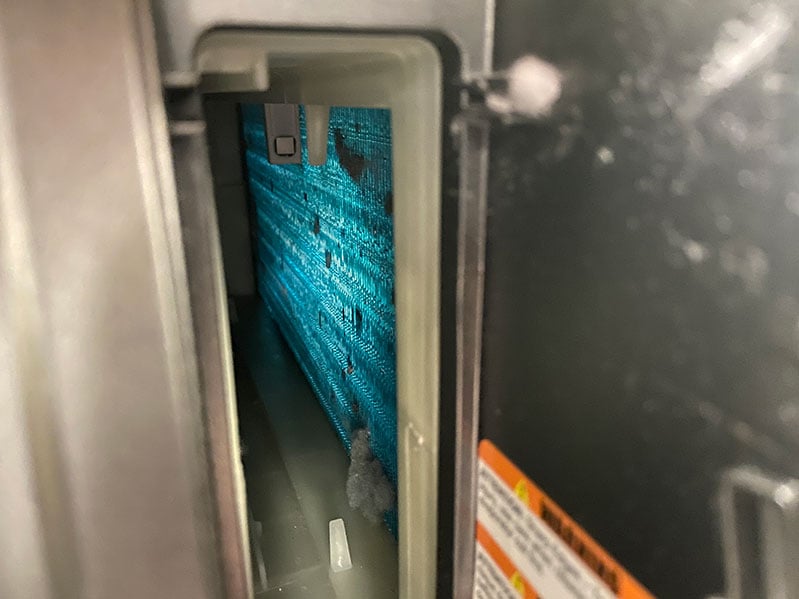
It collects lint at the top of the machine rather than the bottom, making it easier to remove and preventing potentially costly service calls.
Let's see if it works and how and if the lint is captured.
Read More: Are Combo Washer & Dryers Worth It?
GE Profile UltraFast Combo Washer & Dryer: Performance Test
We put the GE Profile UltraFast Combo Washer & Dryer through a series of tests with various laundry types, including everyday clothes, sheets, and a bulky comforter.
Our focus was on evaluating the wash and dry times, the effectiveness of drying, and the machine's lint handling capabilities.
Here are the results of our tests to see if this combo lives up to expectations:
| Colors | Blankets/Sheets | Whites | Comforter | |
| Cycle Used | Towels | Bedding | Whites | Bulky/Bedding |
| Time Indicated | 3 hours and 25 mins | 2 hours and 2 mins | 2 hours and 50 mins | 2 hours and 12 mins |
| Time Completed | 2 hours and 51 mins | 2 hours and 8 mins | 2 hours and 48 mins | 2 hours and 1 min |
| Was It Dry? | Yes | Yes | Yes | Mostly |
| Notes | Washed 6 extra large men's t-shirts and four beach towels | Washed a king-size sheet set and a king-size blanket | Washed 8 men's large dress shirts, four towels, and 8 men's large t-shirts | Washed a king-size comforter |
How Long Did the UltraFast Take to Wash and Dry Towels and Shirts?
For four towels and 6 XL men's shirts, the machine showed 3 hours and 25 minutes but finished in 2 hours and 51 minutes.
How Long Did the UltraFast Take to Wash and Dry Bedding?
For a king-sized sheet and blanket, it showed 2 hours and 2 minutes and finished a bit later at 2 hours and 8 minutes.
How Long Did the UltraFast Take to Wash and Dry a Mixed Load?
For whites, including eight men's shirts, four towels, and eight large T-shirts, the kit showed 2 hours and 50 minutes and was completed in 2 hours and 48 minutes.
How Long Did the UltraFast Take to Wash and Dry a Comforter?
For a comforter, the cycle was completed in 2 hours and 1 minute, while it indicated 2 hours and 12 minutes.
GE Profile PFQ97HSPVDS Drying Performance
It dried well except for the comforter, which was mostly dry and needed more time.
Then again, I need to dry my comforter multiple times in my current dryer.
Other than that, I was impressed with the drying. It works.
GE Profile PFQ97HSPVDS Lint Buildup and Removal






The lint filter removed almost all the lint way better than any combo on the market.
The lint filter is next to the air exchanger's heat sync. It is like the outer fins of your AC unit. So, you must be extremely careful of how you clean it.
GE Profile PFQ97HSPVDS Temperature
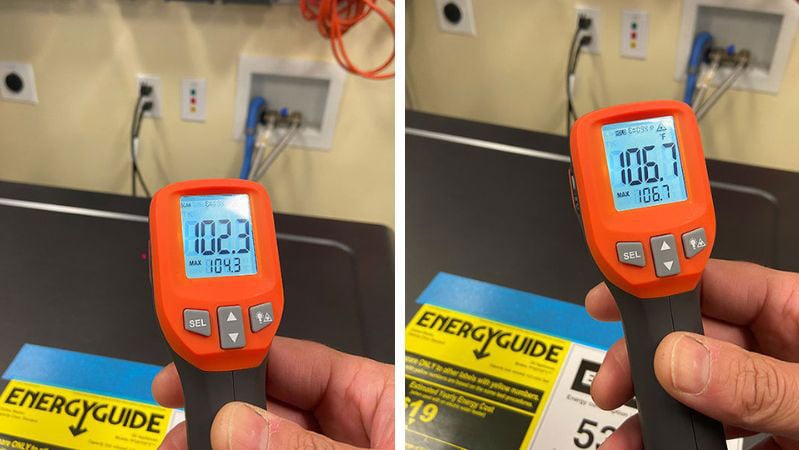
The temperature reached 102-106 degrees, so you want to be careful about what you place on the top.
Comparing the GE Profile UltraFast Combo to Other Top Washer & Dryer Models
In this segment, we're putting the GE Profile UltraFast Combo in a head-to-head comparison with two other notable models: the GE 650 Series Washer and Dryer, and the LG WashTower.
We'll look at what makes each model different, their prices, and how well they work. This will help you figure out which one is right for you.
Let's start by checking out the GE 650 Series Washer and Dryer set.
GE Profile UltraFast Combo vs. GE 650 Series Washer & Dryer
GE 650 Series Overview
The GE 650 Series Washer & Dryer set includes the GE GFW655SSVWW Washer and GE GFD65ESSVWW Dryer.
This set has features like Microban technology to keep mold away, 12 different washing cycles with options like an Allergen cycle, and a system that automatically adds the right amount of detergent.
You can also control it with smart home systems, and the washer door can open both ways for easy use.
GE Profile UltraFast Combo vs. GE 650 Series Washer & Dryer
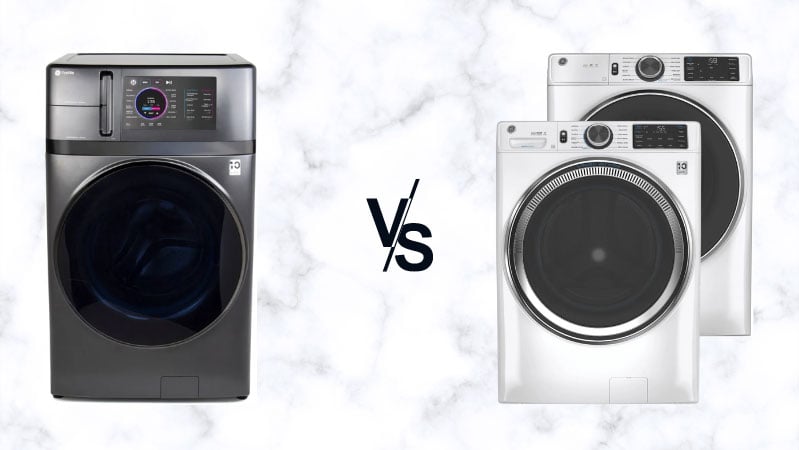
Similarities
Both the GE 650 Series and the GE Profile UltraFast Combo have a capacity of 4.8 cubic feet and offer a high spin speed of 1300 RPM, aiding in pre-drying of clothes.
They are equipped with a 32-load automatic detergent dispenser and feature Microban-coated surfaces for mold resistance.
Additionally, both models support smart functionality through GE's SmartHQ app, enhancing user convenience.
Differences
In terms of dryer technology, the GE 650 Series employs a conventional 220-volt vented dryer, which uses external air heating and expulsion.
In contrast, the GE Profile UltraFast Combo uses a 110-volt heat pump for drying, allowing it to be placed in various locations without the need for external venting.
Price-wise, the GE Profile UltraFast Combo is typically sold at around $2,609, making it more expensive than the GE 650 Series, which ranges from $1,798 to $2,199.
Performance Comparison
Let's delve into the wash and dry times.
GE Profile UltraFast Combo Washer and Dryer Test Results
| Total Wash and Dry Time | |
| Mixed Colors | 2 hours & 51 minutes |
| Whites | 2 hours & 48 minutes |
| Sheets/Blankets | 2 hours & 8 minutes |
| Comforter | 2 hours & 1 minute |
GE 650 Series Washer and Dryer Test Results
| Wash Time | Dry Time | Total Time | |
| Mixed Colors | 59 minutes | 28 minutes | 1 hour & 27 minutes |
| Whites | 1 hour & 9 minutes | 40 minutes | 1 hour & 49 minutes |
| Sheets/Blankets | 1 hour & 8 minutes | 42 minutes | 1 hours & 50 minutes |
| Comforter | 1 hour & 2 minutes | 1 hour & 16 minutes | 2 hours & 18 minutes |
- Colors: The UltraFast takes less time than indicated, with an actual time of 2:51 compared to the indicated 3:25. The GE 650 set requires 1:27 in total.
- Whites: The UltraFast finishes its cycle in about the indicated 2:50. The GE set takes 1:49.
- Sheets/Blankets: The UltraFast, indicated for 2:02, took 2:08. The GE set required less time overall at 1:50.
- Comforter: The UltraFast is slightly quicker than indicated at 2:12, while the GE 650 takes 2:18 to wash and dry.
- The drying system initially projected a drying time of 48 minutes, but it took an additional 28 minutes to fully dry the clothes.
Performance Analysis
The UltraFast washing and drying machine is convenient, but it sometimes leaves the comforter slightly damp. The regular laundry set is faster, even for washing bedding.
If you have separate units for washing and drying, you can transfer clothes from the washer to the dryer and start another load immediately.
But if you have a combo machine like the UltraFast, you have to wait for the entire cycle to finish before starting another load. You can complete more laundry with separate units.
GE Profile UltraFast Combo vs. GE 650 Series: Which One Is Right for You?
The UltraWash is a good option if you don't have a vent or enough power.
However, when comparing the UltraFast to the GE 650 Series washer and dryer, the choice depends on how much laundry you have and your schedule.
Read More: The GE Profile UltraFast Combo vs. Regular GE Washer & Dryers
The GE UltraFast vs. the LG WashTower Washer & Heat Pump Dryers
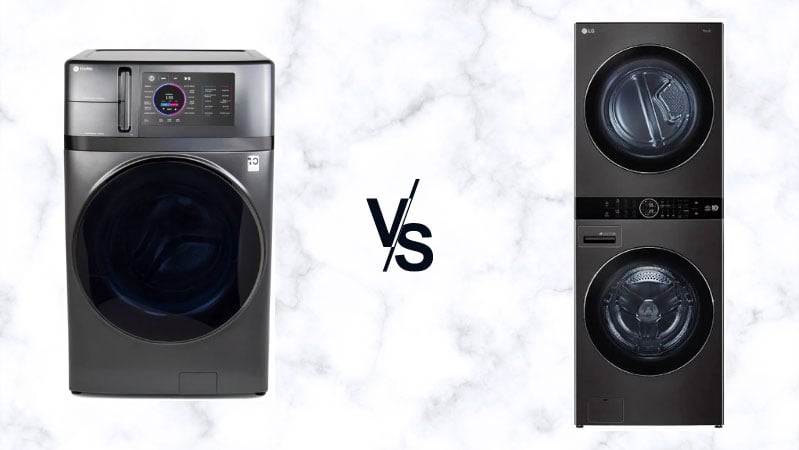
One last comparison (I promise).
Let's say you need ventless or like the idea of a heat pump; the Profile has a legitimate competitor.
The LG WashTower was the second most popular introduction in the last ten years, just after the UltraFast.
The WashTower is stackable with the controls in the middle. You don't have to climb to reach the top controls like you do with two pieces.
I wrote an exhaustive article comparing features. You can click this link to see the full comparison.
Let's look at our LG WashTower test results.
LG WashTower Test Results
| Wash Time | Dry Time | Total Time | |
| Mixed Colors | 32 minutes | 1 hour & 2 minutes | 1 hour & 34 minutes |
| Whites | 36 minutes | 1 hour & `8 minutes | 1 hour & 54 minutes |
| Bedding | 1 hour & 5 minutes | 3 hour & 20 minutes | 4 hours & 25 minutes |
| Comforter | 1 hour & 2 minutes | 2 hour & 45 minutes | 3 hours & 47 minutes |
LG is faster except on bedding because its sensor is driven. The sensors are set for dry, which is nearly impossible on any machine.
But between these two, you can do laundry in the WashTower OR have it washed and dried in the same load with the Profile.
Read More: The GE Profile UltraFast Combo vs. the LG WashTower
Should You Buy the GE Profile UltraFast Combo?
Deciding whether to purchase a new appliance, particularly a modern and unique one, can often be difficult.
The GE Profile PFQ97HSPVDS UltraFast Combo is a washing machine and dryer that raises this question.
In this section, we will discuss who should consider buying this appliance and who should exercise caution.
Your decision will be influenced by factors such as the electrical power in your home, the amount of available space, whether you need to replace an old appliance, and your willingness to experiment with new technology.
Who Should Buy the GE Profile PFQ97HSPVDS
If You Only Have 110 Volts of Power
For people with 110 volts only, this unit is a godsend. You can finally have decent laundry and get your clothes done.
Same with people in voltage-starved older condominiums.
If You Have a Spare Room
You can also place this unit anywhere with water and 110 power, so many rooms in your house could now be laundry rooms.
If You're Replacing a Similar Machine
You can also replace your washer or dryer with this combo. Think about it. You are investing $1700 in just a new washer or dryer.
For Everyone Else
You must weigh the advantages of convenience, energy efficiency, and better drying against the fear of buying unknown products and technology.
For its introduction, buy it from a company with a good service department. You can fix it quickly if it breaks and quicker returns if problems occur.
Either way, this unit is one of the boldest and most innovative we have ever seen at Yale.
It's well designed and engineered and does the job advertised.
Ultimately, the decision of whether or not to purchase the GE Profile PFQ97HSPVDS combo washer and dryer is up to you.
Who Shouldn't Buy the GE Profile PFQ97HSPVDS
Somewhere a designer will incorporate this into a custom laundry room. I wouldn't do that because you won't have any alternatives if it ever needs replacement.
Don't buy it if you are reticent to buy new products.
Your Questions Answered by GE's Lead Designer, Ken Rudolph
In this section, you will find an interesting interview with Ken Rudolph, who is the lead designer at GE.
He will be answering your top questions regarding the GE Profile Ultrafast combo washer and dryer.
Gain insights directly from the expert, from the machine's noise levels to its smart home compatibility.
Click here to watch our initial interview with Ken for a more in-depth look at the release of the GE Profile UltraFast.
1. How Quiet Is the GE UltraFast Combo Washer and Dryer?
"We've measured what the decibel (dB) rating is in both wash and dry [cycles]. And as we mentioned, this is based off our UltraFresh front load. So depending on where it is in the cycle, it's probably in that 52 [decibel level]. If someone had maybe a severe out of balance, it probably gets to about 70 dB, comparable from washer.
But the question we always get is, well, what about drying? How does it compare? It is actually significantly quieter than a standard vented dryer.
I would say that it's in the upper forties to low fifties. And that's because we have an insulated tub. We're not venting externally, and the compressor is very quiet. So people are very surprised at how quiet isn't drying. [People have] actually walk up to it and said, 'Is it drying?'
So overall, we've kept the sound profile pretty much where it should be."
2. What Type of Refrigerant Does the GE Profile UltraFast Combo Use?
"We're presently using R 134 A, and I know we get that question because there are other products out there where R 134 A is going to be replaced by R 600 - [there are] some gripes about that.
Right now, combination all-in-one heat pumps are not regulated to switch from R 134 A to an alternate refrigerant. So we're staying on that. ... Over time, we want to get to the next refrigerant.
So, we're looking at some other ones that are out there right now. But as it stands right now, r 134 A, and there's no legislation in our area to change that."
3. Why Does the GE UltraFast Not Use a Water Heater, and How Does This Sanitize?
"We did have an option of utilizing a heater. We chose not to because we actually have a sanitize with oxy cycle. And what we found is there's actually been a driver of more people wanting to sanitize clothes at lower temperatures rather than heating up the water and doing that.
Actually, sanitization with oxy is an even more effective way of sanitizing your clothes than a heated sanitizer.
And then actually, we also get asked because we have a dewrinkle or a steam dewrinkle in the dryer. They say, 'Well, you don't have a heater.'
Well, guess what? Because it's a dryer, there's some natural ways to heat up that moisture. So, that's how we achieve it.
But to sanitize or to generate that type of heat, we didn't need a dedicated sump heater like you would have in some front load washers."
4. Can a Person in a Wheelchair Access the Dispenser?
"Yeah. So, the product behind me we actually have on our seven inch riser, and that would not make it ADA compliant, but when mounted on the ground, we're at 46.7 inches tall.
What ADA has in the spec is the bottom of the drum has to be above 15 inches, which it is, and the controls and the access areas have to be below 48".
We're at 46.7". And I was thinking about that, right? Because to get to the smart dispense, you will have to lift the bottle up here. But really, the great part about it is if you do use that bulk dispense, that's enough for six weeks of detergent.
The sear and tear on somebody coming up to that really push a couple of buttons. You're not measuring out detergent and doing it.
So, number one, it is ADA compliant in all aspects to start with. And two, I think it's actually easier for those who are physically challenged to use a product of this nature."
5. Is the GE Profile UltraFast Combo Compatible With Amazon's Alexa and Other Virtual Assistants?
"It is through the smart HQ app. ... It doesn't have direct [connectivity], like, our Profile 950 series in our top load, but you can utilize it through the app."
6. Can You Reverse the Door Without Voiding the Warranty?
"This product is not set up to reverse the door. If somebody [did try to reverse the door, it] would take a lot of work, right? So, they'd definitely be voiding the warranty if they did that.
And the reason why we didn't do that initially, quite honestly, we didn't think this would be the runaway hit. ... We also know that one of the reasons why people want to have a reversible door is to make it easier to transfer clothes from the washer to the dryer. ... You're not transferring clothes.
The other thing, and this may just be a little bit out of camera range here, but the way the air comes in here, we wanted to make sure the glass was oriented properly.
Knowing we made on our UltraFresh front load so easy to swap the door, we didn't want someone to align the glass improperly.
It's something we're looking at, but for this product, that has not been a limitation at all."
7. Does the Detergent Dispenser Work Effectively With Hard or Soft Water?
"Yes. So, we actually made our adaptive smart dispenser, our smart dispense product be able to handle all conditions.
Not only will it auto dispense based on the size of the load as well as the type of detergent, but we know if you have hard water, you'll probably want to dose a little bit more so you can adjust it from auto to more.
Or if you have soft water, you can get by with a little less detergent to get the same cleaning power. You can adjust it to less. So it will adjust.
We actually are looking at it's a great question for one of your consumers, automating that in the future, so that based on your municipality and your water type, we can make that adjustment, but right now, the consumer has that capability."
8. Can You Use Lysol Sanitizer in the Dipenser?
"Yes. ... The combo can take the liquid sanitizers that are out there meant for cold sanitization. And if you follow the instructions either from Clorox or RB, which makes Lysol, they'll tell you to put between three to 4oz of that in the fabric softener compartment.
You [shouldn't] put it in the fabric softener or bulk dispenser, but in the top dispenser, where we have a fabric softener compartment. You would dose it there, and then [the machine] knows to dose that properly and per their claims that will deliver that sanitizing benefit in each one.
As far as cleaning the dispenser, actually the dispenser stays really clean. One of the nice things about having the bulk dispense is you're not messy around that.
But if you do want to do the manual dosing, we made very, I would say very friendly sized compartments to be able to use either liquid detergent or powdered detergent, as well as bleach and fabric softener."
9. Can You Connect the GE Profile UltraFast Combo to a Kitchen Sink?
"Yeah, absolutely. This was something that was very interesting, and we actually saw this in a recent trip to New York was people loved to be able to wash and dry in their apartments, but they don't have the water hookup.
So we have an accessory called the unit coupler, and what that allows you to do is actually hook it directly to your faucet. You put it into the cold water inlet of the combo. The combo is smart enough to know ... if you only do cold water, it'll say, 'hey, you need hot water for this.'
So it's smart enough to know it's hooked up to a unicoupler, and you just hook it up to the cold water faucet. Then you take the drain tube and you hook it to the other part of the unit coupler so you can drain directly in the sink.
So for apartment dwellers, for folks that don't have the traditional water outlets as well as standpipe, you can hook this up right next to a sink. And the beauty is it hooks into 120 volts."
10. How Much Energy Does This Use in a Normal Cycle?
"We had to test it as a washer and as a dryer separately. And what I would tell you is this is an Energy Star washer. So this will utilize, I think it's zero point 46 cycles on average from that standpoint. And then what they use in a dryer, it's actually called CEF rating. The larger, the better.
Estar is 3.93. We're at 6.0. So we're 50% more energy efficient. And actually, that's where most of the energy is used. So I believe it's about 1.5 cycles for the dryer.
So what you have here is not only is it delivering the one-and-done promise and the energy, or the space savings and the time savings, but this is the best energy-performing pair that you can have in an all-in-one."
11. Are You Going to Start Manufacturing a Separate Heat Pump Dryer?
"Yeah. I would tell you that historically, and it's something that we started on, I think I talked about in the last video. About seven years ago, we worked on a heat pump dryer program. Consumer acceptance of heat pump dryers was not strong. ... Clearly we have the capability to do a heat pump dryer, and that's in some of our planning as we stand. But right now we're focusing our efforts here on the combo."
12. Have You Considered Producing a Smaller Compact Combo Unit That Could Fit Under a Kitchen Counter?
"There's definitely a market in the compact space. We presently have two products that fit the bill of a 24 inch all in one combination. They're not based on heat pump technology or following what we have right now in the combo.
We have it in both the GE portfolio as well as higher. So we do have a solution that fits under counter 24 inches wide, basically 24 inches deep and as much as 33 inches tall.
But we do see a natural progression is to take this breakthrough technology into other platforms like that."
13. How Many Gallons of Water Does This Use in Normal and Heavy Cycles?
"So some easy math, right? So this has a water factor, an IWF of 3.0. It's 4.8 cubic foot. You just do the simple math. So it'll use 14.4 gallons in a standard wash cycle. So front loaders, which the combo is based off, are extremely water efficient."
14. Would You Recommend the GE Profile UltraFast Combo in a Household with Large Animals in Terms of Hair and Lint Buildup?
"Well, I'll tell you, not only would I recommend it, I would actually suggest that this is probably one of the best products for handling that. The reason is this, the upfront easy-to-access lint filter.
If you think about it, when you handle heavy pet hair today, right, some of it gets clogged in your washer. It's either left behind in the gasket or it goes down the drain pump. And then you move it over and you find the rest of that pet hair in the dryer.
Since we're [using] an all-in-one, you're not going to have to deal with wet gunky pet hair out of the washer. It's going to be dry. We actually have someone on our team who has a St. Bernard and they were talking about how the pet hair actually stands up and is so easy to clean off of here.
So we're doing some evaluation right now. We believe the combo can demonstrate that extremely well. So sort of stay tuned for that for our pet owners.
But what I can tell you right now, [I have] a lot of confidence in the product to be able to handle that."
15. How Did the Gasket Manage to Stay Bone Dry Despite the Absence of an Odor Block Fan, as Observed During Our Tests?
"That was one of the things that what we have coming up with this product is we do know some folks like to do a wash only still. So we're going to have an ultra fresh cycle that will be downloadable onto this product.
But you nailed it perfectly, right? It's all about drain dry and defend. We drain really well. This is a dryer, so we know it dries really well. And then just like in our ultra fresh front load and our top load now, you see the blue, right?
This is microband throughout the gasket, through the dispenser, the pump housing and the drain tube out the back. And we've had ultra fresh with microband in the market since 2019 and it is performing to expectations.
So we're excited. We believe the combo, just like you said, it dries really well. It's going to do oven better."
16. Why Don't You Need Dryer Sheets or Wool Dryer Balls with the GE Profile UltraFast?
"There is an easy way to add either dryer balls or dryer sheets. So we added a function, even when you're doing a wash and dry, to hit a button called Wash Complete. And what that'll send you? It'll alert you to your smart HQ device, your smartphone, or right in the machine that says, 'hey, you can pause the cycle and throw that dryer ball and dryer sheet in' if that's what you like.
We often ask people, why are you using those? Right? And they'll say, well, cut down on static. What I tell you is, with the airflow and the lower heat, we do not generate static. So if that's why you're using a dryer ball, you don't need that.
The other thing they do is because it helps the clothes in tumbling. This is a reverse tumbling machine. So we unfold those clothes extremely well. We don't get knotted clothes at the end of the cycle. So really, as you pointed out, you shouldn't need those products.
The one thing that people have talked about is, well, I like that fresh scent from that. The other thing is this is a sealed system.
That was one of the delighters that we had with our team as well; we said, you know what, actually, the fragrance from the detergent or the softener that I really love carried through better because you weren't blowing that scent out the back of the door [while] drying. So it worked really well.
They were reintroducing scent in the dryer because they knew they were going to lose it. You don't lose it here. So I think you've given people good reasons why they don't need those extra pieces, but we made it so that if they still want to use them, they can."
17. Can You Use Vibration Pads With the GE Profile UltraFast Combo Washer & Dryer?
"You can. Our evaluation is with the leveling legs that we have today, as well as the riser, which is an optional accessory to be able to handle that.
But if folks find that they're getting better performance with vibration pads, we do sell that as an accessory. So those are available.
What I would tell you is, in vibration, even though the unit is a little bit taller and a little bit heavier, it has very much the same vibration signature that you would have out of our ultra fresh front load washer. So they're okay on that.
You're not voiding the warranty if you choose to use it."
Final Thoughts
Do you think the Profile PFQ97HSPVDS UltraFast Combo is a good choice for your laundry needs?
We'd love to hear your thoughts. Please share them in the comments section below.
FAQs
Answers to the most commonly asked questions about the GE UltraFast Combo Washer & Dryer.
How long does the average full cycle take?
In our tests the average time was about 2 hours and 15 minutes for the normal cycles to wash and dry. If you want to see the full tests, click here.
How do you use dryer sheets in it?
For dryer sheets, you can set the unit to pause between the wash and dry cycles and then toss in the dryer sheets, but that defeats the purpose behind getting the unit in the first place.
Being a unique type of laundry machine, how much space do I need?
The GE UltraFast combo is tested for zero clearance on both sides front and back. However, with the spin speed, you should leave 1/4 to 1/2 inch from the wall.
How often should you clean each part?
You’ll have to clean the lint filter after each drying cycle, just like you would with a normal dryer. According to the unit's manual, GE Profile recommends to clean the heat sink every four loads, but it's so easy I would do it every time.
Can you use the auto dispenser on all the modes? In addition, how many loads does the dispenser hold?
For the dispenser, you can choose to manually dispense even with a loaded dispenser. It holds about 32 loads worth of detergent.
How much does it cost?
The GE Profile UltraFast Combo Washer & Dryer costs $2,609. Now, whether they put it on promotion during holidays remains to be seen.
How is it different from previous combo models?
First, they addressed the lint problem by employing a larger lint filter at the top of the machine. Combo washer and dryers historically can’t remove lint which leads to expensive service problems.
Does it have a water heater?
They didn't use a hot water heater because the hot water line is hot enough to adequately wash your clothes.
Is the door reversible?
It looks like it is, and looks like it could be. However, I read through the instruction manual and there is no mention of the unit's door being reversible, so I wouldn’t reverse it even if it looks simple to do.
Additional Resources
Download our Yale Washer and Dryer Buying Guide with all the features, terms, and brands of laundry. Over 1 million people have already found answers in a Yale guide.
Related Articles:
- Are Combo Washers and Dryers Reliable?
- Are Combo Washer and Dryers Worth It?
- GE Profile vs. LG vs. Samsung Combo Washers and Dryers
- Should You Buy the LG WashCombo All-in-One WM6998HBA?
- Samsung Bespoke AI Combo Washer-Dryer WD53DBA900HZA1: 2024 Review
Recent Posts
Why Should You Trust Us?
It seems that every appliance review has nothing but glowing comments about almost every product, yet you read customer reviews and they are almost universally bad.
We are here to fill in the disconnect. We'll give you the best features, and the drawbacks as well, including reliability based on over 37,000 calls performed by our service team just last year. Our goal is to give you ALL the information so you know what's right for you.
Please consider subscribing or adding to the conversation in the comments below. We appreciate you stopping by.
Steve Sheinkopf is the third-generation CEO of Yale Appliance and a lifelong Bostonian. He has over 38 years of experience in the appliance industry, and he is a trusted source of information for consumers on how to buy and repair appliances.
Steve has also been featured in numerous publications, including the
New York Times,
Consumer Reports,
The Boston Globe,
Bloomberg Radio, the
New York Post,
The Wall Street Journal, and
Entrepreneur, for his knowledge of how to buy appliances and appliance repair.
Steve is passionate about helping consumers find the best appliances for their needs, and he is always happy to answer questions and provide advice. He is a valuable resource for consumers who are looking for information on appliance buying, repair, and maintenance.
Despite being the worst goalie in history, Steve is a fan of the Bruins and college hockey, loves to read, and is a Peloton biker. The love of his life is his daughter, Sophie.
A Note About Pricing
Pricing on this blog is for reference only and may include time sensitive rebates. We make every attempt to provide accurate pricing at time of publishing. Please call the stores for most accurate price.
Topics:


